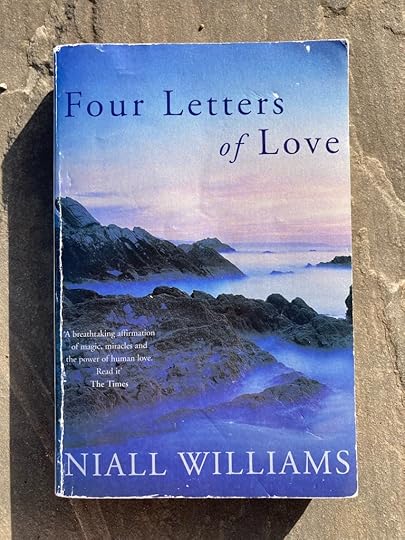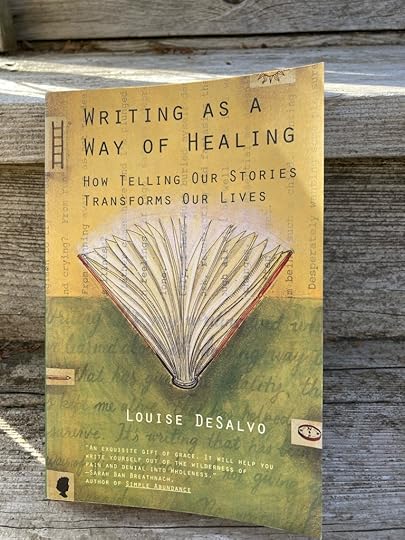Words that Heal
My friend and neighbour Renée Hartleib is the author of today’s guest post, and it’s a great pleasure to introduce her. Renée is an author, writer, and writing mentor, and she says her “greatest passion is to help others connect with themselves and bring their creative dreams to life.” She lives in Halifax, Nova Scotia, with her family, one dog, many felines, and a “book nook” in front of the house.
Her book Writing Your Way: a 40-Day Path of Self-Discovery was published last fall. I attended the launch at the Writers’ Federation of Nova Scotia and there was a tremendous amount of positive energy in the room as so many people gathered to celebrate Renée and her fabulous new book.
The book arose from the “40-Day Writing Project” she designed and has shared many times with different groups over the last few years. (You can find more details about her online writing community and sign up for her monthly emails on her website. If you’re looking for a writing mentor or editor to help you finish a book or assess a first draft, get in touch with Renée directly. She’s a fantastic editor and coach and I recommend her highly!) Each chapter begins with an inspirational quotation—such as Rainer Maria Rilke’s famous advice about learning to “live the questions”—followed by compelling stories from Renée’s own creative journey, along with writing prompts designed to help readers explore their own lives, past and present, and their dreams of renewal and transformation for the future. As I mentioned when I wrote about the book here last fall, when I read it I was reminded of what Jane Austen’s Fanny Price says in Mansfield Park about how “We have all a better guide in ourselves, if we would attend to it, than any other person can be.” Renée suggests that writing can help us find that “better guide”—she says, “Some might call it your soul, your spirit, or your essence.”
I’m delighted to share with you Renée’s guest post about three of her favourite books, Four Letters of Love, by Niall Williams, The Camino Letters: 26 Tasks on the Way to Finisterre, by Julie Kirkpatrick, and Writing as a Way of Healing: How Telling Our Stories Transforms Our Lives, by the late Louise DeSalvo.



Thank you to Sarah for inviting me to write a guest post on her wonderful blog! I’m excited to tell you about three of my favourite books. While they are all different genres they share a common thread. There’s a book of fiction I have long loved, a memoir I just finished, and a non-fiction book I return to again and again in my life and my work.
Four Letters of Love by Niall Williams is a novel I first read over twenty years ago and have re-read many times since. Whenever anyone asks me about “favourite books of all time,” it’s there. First because the writing is exquisite, but also because of the book’s powerful and overarching message of love and goodness, even in the face of obstacles, other people’s bad behaviour, and unfair twists of fate.

The book is set in Ireland and when it begins, our narrator, Nicholas Coughlan, is twelve years old. His world has just been turned upside down by his father, the family’s primary breadwinner, who has left his job and decided to paint for a living because God asked him to. Woven throughout this first person account are other chapters, written in the third person, that tell the story of another character, Isabel Gore. She lives on an island off the Galway Coast and feels haunted by, and responsible for, her younger brother’s physical paralysis.
There is an old-fashioned love story at work here, but simultaneously author Niall Williams writes about divine love and self-love and how healing is possible. It’s about the love that shines—like a shot of sunlight on the sea—through our moments of nearly unbearable sadness and grief. He reminds us what it means to trust in life and to trust in something larger than ourselves.
“There was in the air at that moment that rare feeling of healing, of things lifting and coming together, of the story being carried suddenly forward, the great whoosh on which everything suddenly rises and flows, and you know a great spirit is somewhere watching down.”
Every time I read this novel, I remember that life is a beautiful mystery and the best thing we can do is to embrace and explore that mystery and simply trust. In love, in life, and in ourselves.

The Camino Letters: 26 Tasks on the Way to Finisterre is a memoir I read when it first came out in 2010 and then again more recently because of my plan to walk the Camino de Santiago next year. As I prepare, I find myself drawn not only to guidebooks but also to first person accounts of walking this ancient pilgrimage trail in Spain.
I hadn’t recalled much about the content of this book; only that I absolutely loved it and it moved me. Second time around, it did not disappoint. Right from the preface, author Julie Kirkpatrick, who is a Canadian lawyer as well as a writer, makes it plain that she didn’t really understand what she was getting herself into when she decided to walk the Camino. The only nod to preparation was spontaneously asking 26 friends to assign her a daily task for each day of her long walk.
The book is made up of the daily letters she wrote her friends about the outcome of each of the tasks they assigned her. Some of the tasks sounded simple (listen to the wind, be mellow, give something away) but there was nothing simple about what she experienced on the Camino path. As Kirkpatrick says: “The act of putting one foot in front of the other, day after day, with only my tasks to answer to, led me on an interior journey that I was not prepared for and was not expecting.”
The letters are a deep dive into the backstory of the author’s life, written with incredible generosity and heart. Her writing is raw and vulnerable and and she is honest about her own shortcomings and missteps. She peels back protective layers to write with great candor about some of the most painful events of her life: losing her mother at a young age, living with an autoimmune condition that can result in sudden blindness, and the stillbirth of a child.
As the reader, it’s beautiful to witness the revelations and insights that happen over the course of Kirkpatrick’s journey, as both the Camino and the writing work in concert to bring about healing. The result is a profound reading experience for which I’m very grateful.
This is a perfect segue to the last book on my list. Writing as a Way of Healing: How Telling Our Stories Transforms Our Lives by the late Louise DeSalvo was gifted to me by my writing mentor, Pam Donoghue, during our work together in the Writers’ Federation of Nova Scotia’s Alistair MacLeod Mentorship Program.

Over the last twenty years, DeSalvo’s book has had a huge impact on me personally, as well as guiding me on my path to become a writing mentor. I have suggested this book to more clients than I can count. In a nutshell, this book is about how writing, as a complement to therapy, can heal the most thorny and persistent and messy wounds of our lives.
“Why, then, should we write? Because writing permits the construction of a cohesive, elaborate, thoughtful personal narrative in the way that simply speaking about our experiences doesn’t. Through writing, suffering can be transmuted into art. And writing permits us to use our writing as a form of public testimony in a way that the private act of therapy doesn’t.”
As someone who has always written to make sense of my life, I found that DeSalvo’s book deepened my understanding of what writing can do for us. I have taken her words to heart over the years, first in blog posts and most recently in my book Writing Your Way, where I share personal stories about the things that have held me back from both creating and living fully.
What I discovered as I wrote my book is exactly what DeSalvo stated. Through the act of writing about some of my most vulnerable experiences I began to feel my way toward a new understanding and a healing of old wounds. Once I published my book and it was being read by both strangers and friends, that sense of healing only deepened as my words began to help readers discover their own hidden truths.
I hope you can see the thread that ties these wonderful books together. All three have inspired me with their magical combination of heart and soul and with the light they have shone on growth and healing. I hope you seek them out and that they spark something within you.
Happy reading and happy writing!



